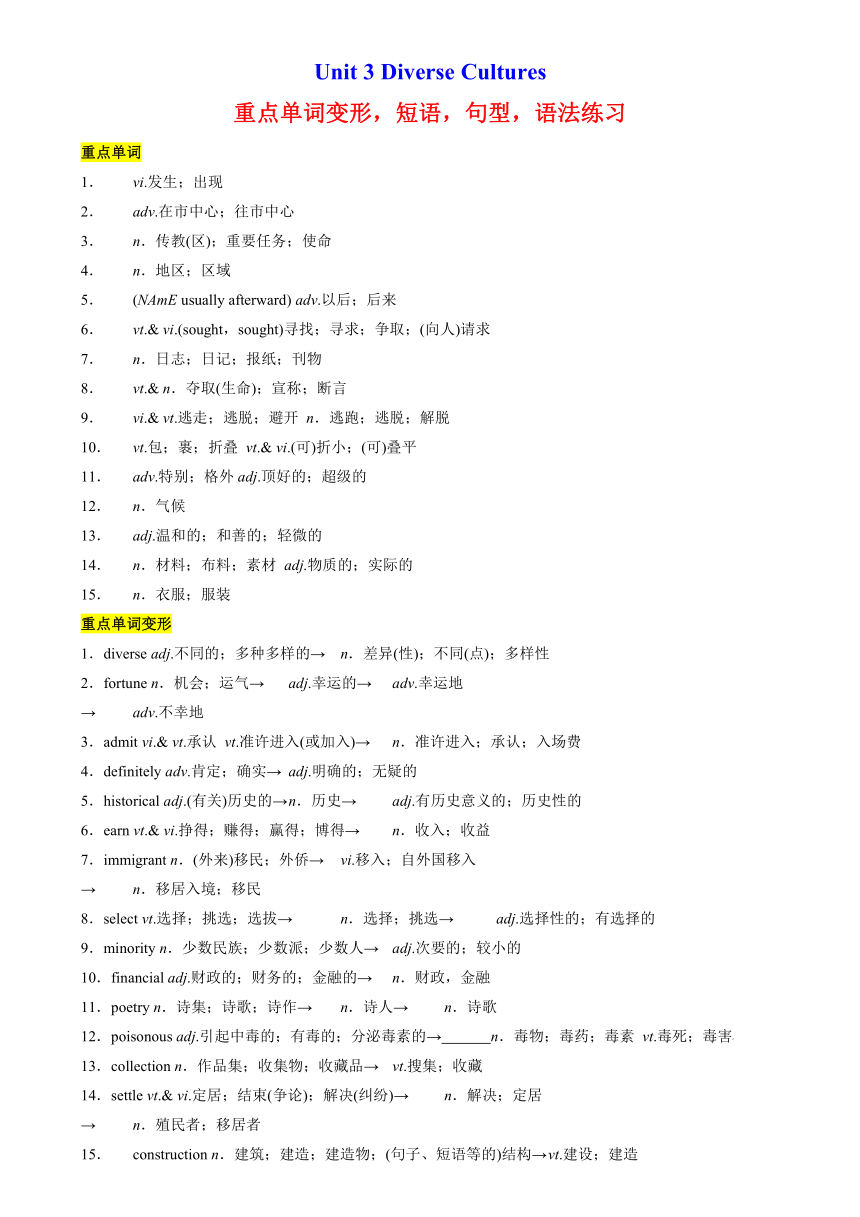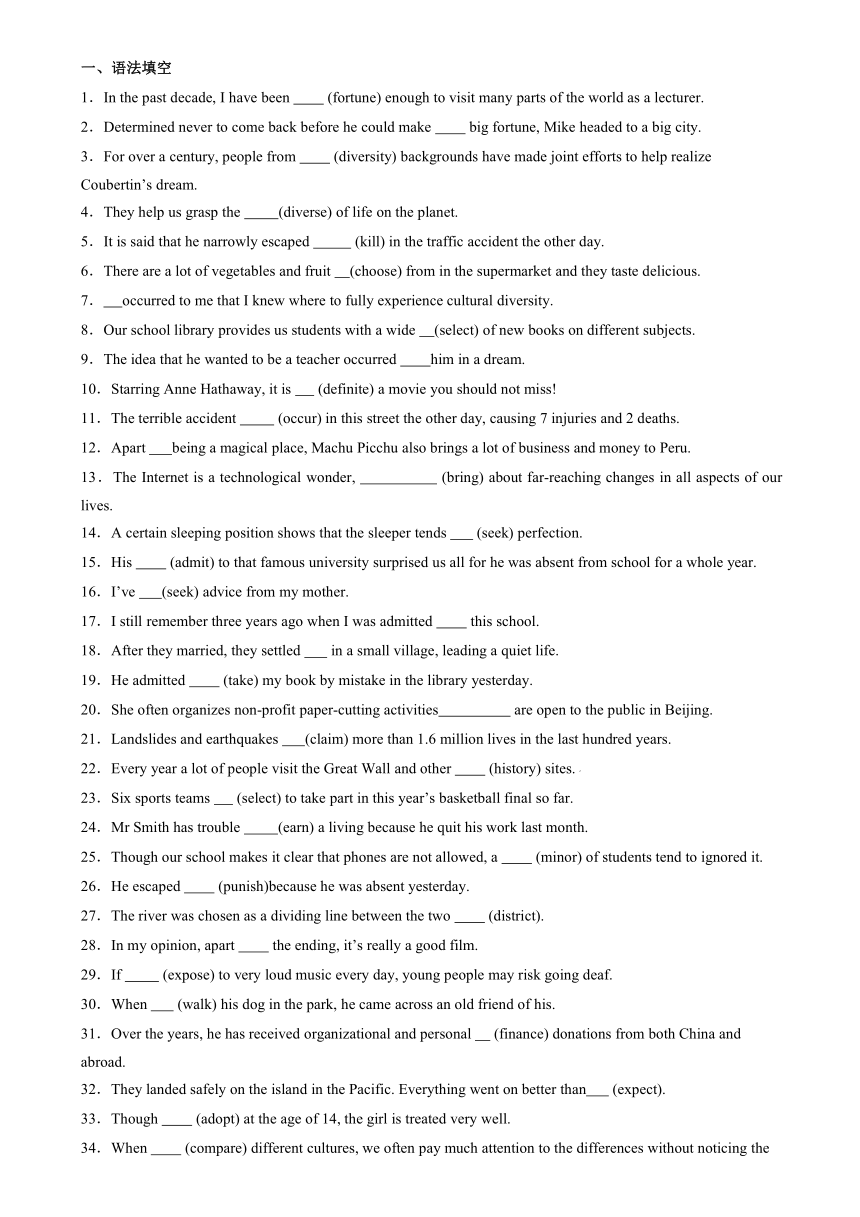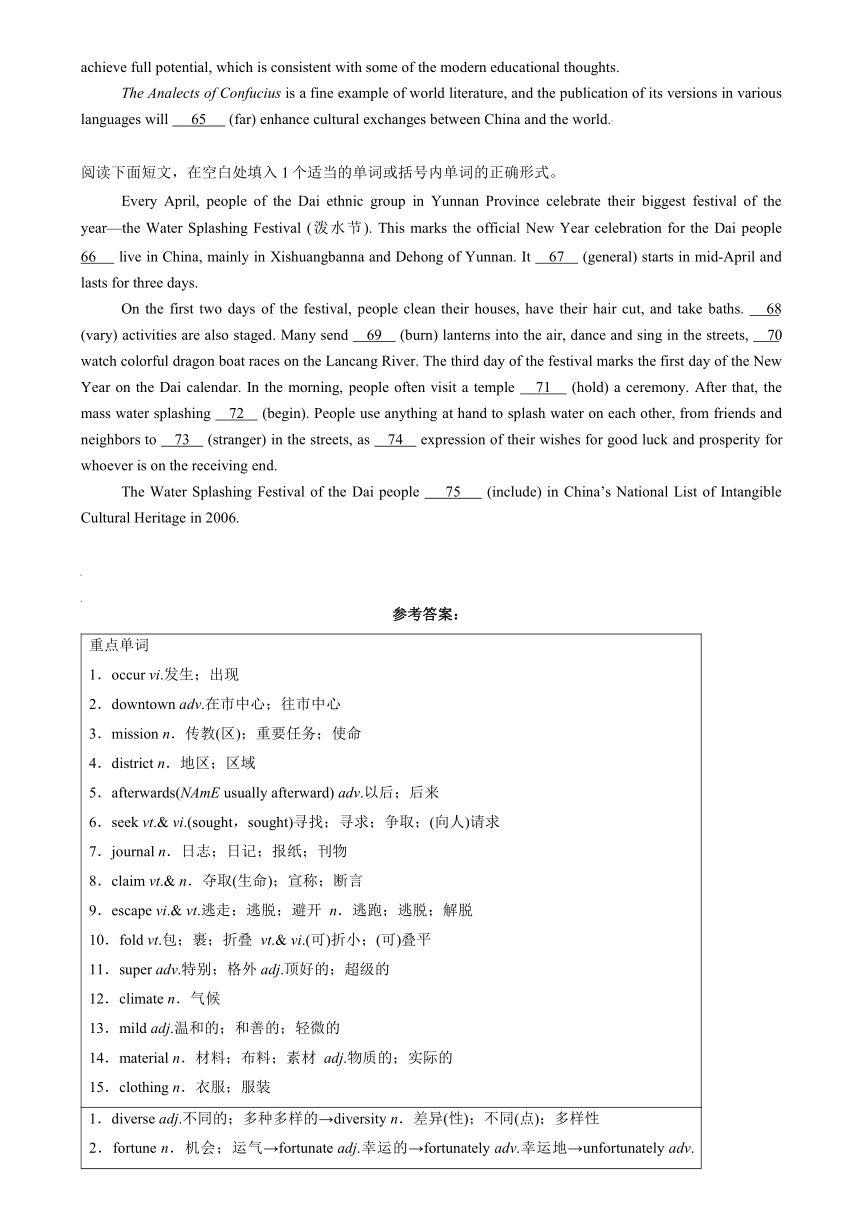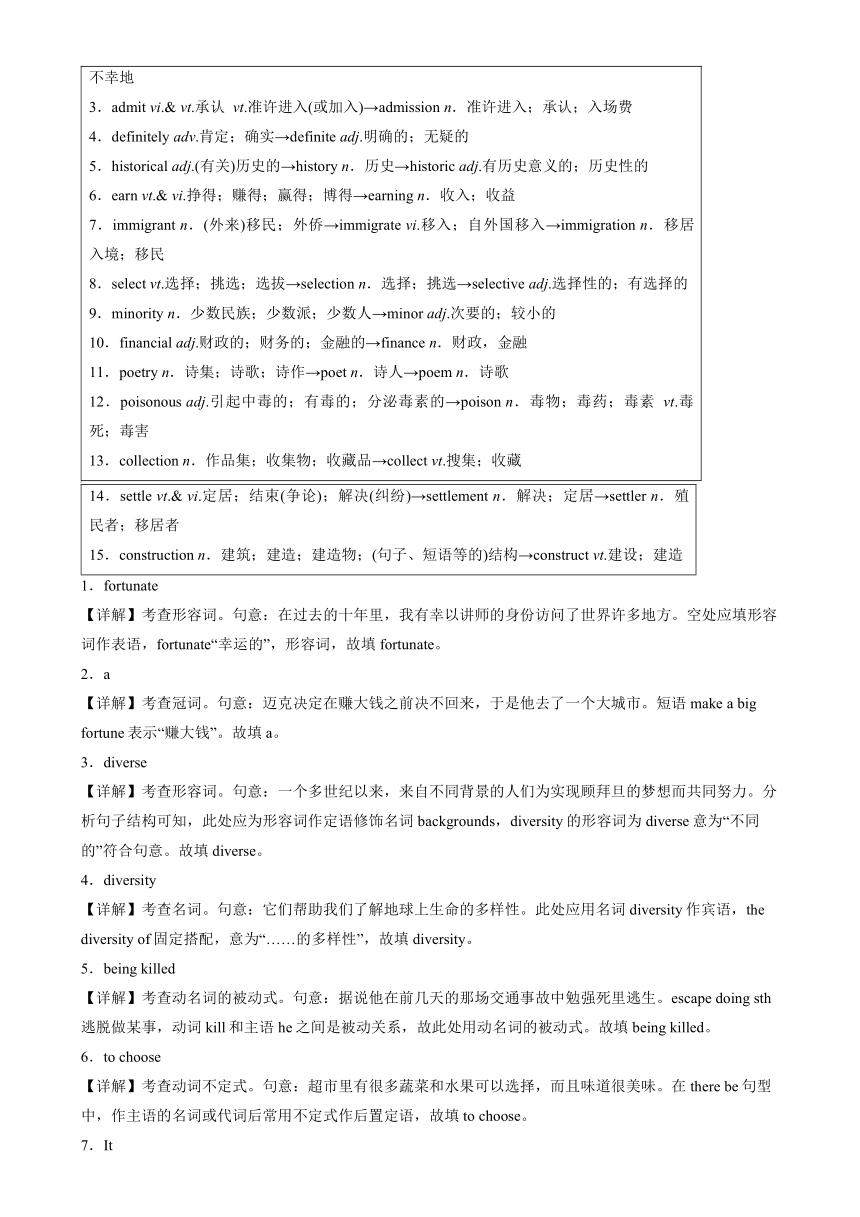2023-2024学年高一英语必修第三册Unit 3 Diverse Cultures 单词变形,短语,句型,语法知识点复习(人教版2019)(含解析)
文档属性
| 名称 | 2023-2024学年高一英语必修第三册Unit 3 Diverse Cultures 单词变形,短语,句型,语法知识点复习(人教版2019)(含解析) |

|
|
| 格式 | docx | ||
| 文件大小 | 52.0KB | ||
| 资源类型 | 教案 | ||
| 版本资源 | 人教版(2019) | ||
| 科目 | 英语 | ||
| 更新时间 | 2024-06-07 00:00:00 | ||
图片预览





文档简介
Unit 3 Diverse Cultures
重点单词变形,短语,句型,语法练习
重点单词
1. vi.发生;出现
2. adv.在市中心;往市中心
3. n.传教(区);重要任务;使命
4. n.地区;区域
5. (NAmE usually afterward) adv.以后;后来
6. vt.& vi.(sought,sought)寻找;寻求;争取;(向人)请求
7. n.日志;日记;报纸;刊物
8. vt.& n.夺取(生命);宣称;断言
9. vi.& vt.逃走;逃脱;避开 n.逃跑;逃脱;解脱
10. vt.包;裹;折叠 vt.& vi.(可)折小;(可)叠平
11. adv.特别;格外adj.顶好的;超级的
12. n.气候
13. adj.温和的;和善的;轻微的
14. n.材料;布料;素材 adj.物质的;实际的
15. n.衣服;服装
重点单词变形
1.diverse adj.不同的;多种多样的→ n.差异(性);不同(点);多样性
2.fortune n.机会;运气→ adj.幸运的→ adv.幸运地
→ adv.不幸地
3.admit vi.& vt.承认 vt.准许进入(或加入)→ n.准许进入;承认;入场费
4.definitely adv.肯定;确实→ adj.明确的;无疑的
5.historical adj.(有关)历史的→ n.历史→ adj.有历史意义的;历史性的
6.earn vt.& vi.挣得;赚得;赢得;博得→ n.收入;收益
7.immigrant n.(外来)移民;外侨→ vi.移入;自外国移入
→ n.移居入境;移民
8.select vt.选择;挑选;选拔→ n.选择;挑选→ adj.选择性的;有选择的
9.minority n.少数民族;少数派;少数人→ adj.次要的;较小的
10.financial adj.财政的;财务的;金融的→ n.财政,金融
11.poetry n.诗集;诗歌;诗作→ n.诗人→ n.诗歌
12.poisonous adj.引起中毒的;有毒的;分泌毒素的→ n.毒物;毒药;毒素 vt.毒死;毒害
13.collection n.作品集;收集物;收藏品→ vt.搜集;收藏
14.settle vt.& vi.定居;结束(争论);解决(纠纷)→ n.解决;定居
→ n.殖民者;移居者
construction n.建筑;建造;建造物;(句子、短语等的)结构→ vt.建设;建造
一、语法填空
1.In the past decade, I have been (fortune) enough to visit many parts of the world as a lecturer.
2.Determined never to come back before he could make big fortune, Mike headed to a big city.
3.For over a century, people from (diversity) backgrounds have made joint efforts to help realize Coubertin’s dream.
4.They help us grasp the (diverse) of life on the planet.
5.It is said that he narrowly escaped (kill) in the traffic accident the other day.
6.There are a lot of vegetables and fruit (choose) from in the supermarket and they taste delicious.
7. occurred to me that I knew where to fully experience cultural diversity.
8.Our school library provides us students with a wide (select) of new books on different subjects.
9.The idea that he wanted to be a teacher occurred him in a dream.
10.Starring Anne Hathaway, it is (definite) a movie you should not miss!
11.The terrible accident (occur) in this street the other day, causing 7 injuries and 2 deaths.
12.Apart being a magical place, Machu Picchu also brings a lot of business and money to Peru.
13.The Internet is a technological wonder, (bring) about far-reaching changes in all aspects of our lives.
14.A certain sleeping position shows that the sleeper tends (seek) perfection.
15.His (admit) to that famous university surprised us all for he was absent from school for a whole year.
16.I’ve (seek) advice from my mother.
17.I still remember three years ago when I was admitted this school.
18.After they married, they settled in a small village, leading a quiet life.
19.He admitted (take) my book by mistake in the library yesterday.
20.She often organizes non-profit paper-cutting activities are open to the public in Beijing.
21.Landslides and earthquakes (claim) more than 1.6 million lives in the last hundred years.
22.Every year a lot of people visit the Great Wall and other (history) sites.
23.Six sports teams (select) to take part in this year’s basketball final so far.
24.Mr Smith has trouble (earn) a living because he quit his work last month.
25.Though our school makes it clear that phones are not allowed, a (minor) of students tend to ignored it.
26.He escaped (punish)because he was absent yesterday.
27.The river was chosen as a dividing line between the two (district).
28.In my opinion, apart the ending, it’s really a good film.
29.If (expose) to very loud music every day, young people may risk going deaf.
30.When (walk) his dog in the park, he came across an old friend of his.
31.Over the years, he has received organizational and personal (finance) donations from both China and abroad.
32.They landed safely on the island in the Pacific. Everything went on better than (expect).
33.Though (adopt) at the age of 14, the girl is treated very well.
34.When (compare) different cultures, we often pay much attention to the differences without noticing the similarities between them.
35.When ( teach) English, whether to children or adults, you have to be very creative to keep their interest.
36.A small percentage of the students (be) from the countryside.
37.The percentage of women engineers (be) small.
38.The museum is filled with a collection ancient beds and chairs.
39.Located where the Belt meets the Road, Jiangsu will contribute more to the Belt and Road (construct).
40.The students, all of spent the whole day picking fruits, were extremely tired.
41.This kind of food is not (suit) for the patients so you should change it.
42.No matter how (mild) I mentioned it to her,she would be deeply hurt.
43.She can always put other people right, but will never admit (make) an error herself.
44.The size and shape of your nose is determined by the climate you live,according to a new research.
45.We can see many short videos sharing how to make delicious snacks and in the end the people often put them into a beautiful (contain).
阅读下面材料,在空白处填入适当的内容(1个单词)或括号内单词的正确形式。
The Duanwu Festival, known as the Dragon Boat Festival, 46 (found) during the Warring States period (475-221BC) in memory of QuYuan, 47 was a scholar and minister of the state of Chu. The festival falls on the 48 (five) day of May on the Chinese lunar calendar.
It is commonly believed that the local people began 49 tradition of throwing sacrificial cooked rice into the river for Qu Yuan, hoping that the rice would prevent Qu Yuan's body from 50 (eat) by the fishes in the river. Zongzi, rice dumplings wrapped in bamboo 51 (leaf), remain with us today as the traditional way to celebrate the Dragon Boat Festival. In general, northern Chinese prefer sweet versions of these steamed treats while southerners like 52 (salt) tastes.
A dragon boat, 53 (usual) made of wood to various designs and sizes, is a human-powered boat. They often have brightly decorated designs that range anywhere from 40 feet in length 54 100 feet, with the front end shaped like open-mouthed dragons, and the back end with a scaly tail. A sacred ceremony is performed before any competition in order to “bring the boat to life” by painting the eyes. The first team 55 (gain) a flag at the end of the course wins the race.
阅读下面短文,在空白处填入1个适当的单词或括号内单词的正确形式。
The Analects of Confucius《论语》records the words and deeds of the ancient Chinese philosopher Confucius, 56 (write) somewhere between the Spring and Autumn Period and the Warring States Period more than 2,000 years ago. 57 highlights the political and moral ideas of Confucius and Confucianism.
Ren is a core concept in the book adopted by Confucius with original meaning of loving others. 58 (represent) a high moral standard, it includes all virtues. Confucius stresses that self-discipline is 59 must for practicing the rules of propriety (礼) and achieving ren.
Society has developed greatly and huge changes 60 (occur) as well after the birth of the Analects of Confucius. Nevertheless, it contains lots or ideas beyond the passage of time, some of 61 are still relevant today. For example, Confucius analyzes the relationship between learning and thinking by saying that learning without thinking leads to 62 (confuse) while thinking without learning ends in puzzlement. Besides, the Analects of Confucius also vividly shows the 63 (image) of Confucius’s students. Zi Lu is straightforward. Zi Gong is smart, and Yan Hui is mild and capable. Confucius insists on treating students 64 individuals to achieve full potential, which is consistent with some of the modern educational thoughts.
The Analects of Confucius is a fine example of world literature, and the publication of its versions in various languages will 65 (far) enhance cultural exchanges between China and the world.
阅读下面短文,在空白处填入1个适当的单词或括号内单词的正确形式。
Every April, people of the Dai ethnic group in Yunnan Province celebrate their biggest festival of the year—the Water Splashing Festival (泼水节). This marks the official New Year celebration for the Dai people 66 live in China, mainly in Xishuangbanna and Dehong of Yunnan. It 67 (general) starts in mid-April and lasts for three days.
On the first two days of the festival, people clean their houses, have their hair cut, and take baths. 68 (vary) activities are also staged. Many send 69 (burn) lanterns into the air, dance and sing in the streets, 70 watch colorful dragon boat races on the Lancang River. The third day of the festival marks the first day of the New Year on the Dai calendar. In the morning, people often visit a temple 71 (hold) a ceremony. After that, the mass water splashing 72 (begin). People use anything at hand to splash water on each other, from friends and neighbors to 73 (stranger) in the streets, as 74 expression of their wishes for good luck and prosperity for whoever is on the receiving end.
The Water Splashing Festival of the Dai people 75 (include) in China’s National List of Intangible Cultural Heritage in 2006.
参考答案:
重点单词 1.occur vi.发生;出现 2.downtown adv.在市中心;往市中心 3.mission n.传教(区);重要任务;使命 4.district n.地区;区域 5.afterwards(NAmE usually afterward) adv.以后;后来 6.seek vt.& vi.(sought,sought)寻找;寻求;争取;(向人)请求 7.journal n.日志;日记;报纸;刊物 8.claim vt.& n.夺取(生命);宣称;断言 9.escape vi.& vt.逃走;逃脱;避开 n.逃跑;逃脱;解脱 10.fold vt.包;裹;折叠 vt.& vi.(可)折小;(可)叠平 11.super adv.特别;格外adj.顶好的;超级的 12.climate n.气候 13.mild adj.温和的;和善的;轻微的 14.material n.材料;布料;素材 adj.物质的;实际的 15.clothing n.衣服;服装
1.diverse adj.不同的;多种多样的→diversity n.差异(性);不同(点);多样性 2.fortune n.机会;运气→fortunate adj.幸运的→fortunately adv.幸运地→unfortunately adv.不幸地 3.admit vi.& vt.承认 vt.准许进入(或加入)→admission n.准许进入;承认;入场费 4.definitely adv.肯定;确实→definite adj.明确的;无疑的 5.historical adj.(有关)历史的→history n.历史→historic adj.有历史意义的;历史性的 6.earn vt.& vi.挣得;赚得;赢得;博得→earning n.收入;收益 7.immigrant n.(外来)移民;外侨→immigrate vi.移入;自外国移入→immigration n.移居入境;移民 8.select vt.选择;挑选;选拔→selection n.选择;挑选→selective adj.选择性的;有选择的 9.minority n.少数民族;少数派;少数人→minor adj.次要的;较小的 10.financial adj.财政的;财务的;金融的→finance n.财政,金融 11.poetry n.诗集;诗歌;诗作→poet n.诗人→poem n.诗歌 12.poisonous adj.引起中毒的;有毒的;分泌毒素的→poison n.毒物;毒药;毒素 vt.毒死;毒害 13.collection n.作品集;收集物;收藏品→collect vt.搜集;收藏
14.settle vt.& vi.定居;结束(争论);解决(纠纷)→settlement n.解决;定居→settler n.殖民者;移居者 15.construction n.建筑;建造;建造物;(句子、短语等的)结构→construct vt.建设;建造
1.fortunate
【详解】考查形容词。句意:在过去的十年里,我有幸以讲师的身份访问了世界许多地方。空处应填形容词作表语,fortunate“幸运的”,形容词,故填fortunate。
2.a
【详解】考查冠词。句意:迈克决定在赚大钱之前决不回来,于是他去了一个大城市。短语make a big fortune表示“赚大钱”。故填a。
3.diverse
【详解】考查形容词。句意:一个多世纪以来,来自不同背景的人们为实现顾拜旦的梦想而共同努力。分析句子结构可知,此处应为形容词作定语修饰名词backgrounds,diversity的形容词为diverse意为“不同的”符合句意。故填diverse。
4.diversity
【详解】考查名词。句意:它们帮助我们了解地球上生命的多样性。此处应用名词diversity作宾语,the diversity of固定搭配,意为“……的多样性”,故填diversity。
5.being killed
【详解】考查动名词的被动式。句意:据说他在前几天的那场交通事故中勉强死里逃生。escape doing sth逃脱做某事,动词kill和主语he之间是被动关系,故此处用动名词的被动式。故填being killed。
6.to choose
【详解】考查动词不定式。句意:超市里有很多蔬菜和水果可以选择,而且味道很美味。在there be句型中,作主语的名词或代词后常用不定式作后置定语,故填to choose。
7.It
【详解】考查固定句型。句意:我突然想到,我知道在哪里可以充分体验文化多样性。It occurs/occurred to sb. that...为固定句型,意为“某人突然想到……”,其中It是形式主语,that引导的是主语从句。故填It。
8.selection
【详解】考查名词。句意:我们学校的图书馆为我们学生提供了广泛的不同学科的新书可供选择。空处应填名词作介词with的宾语,selection选择,可供选择的事物,在句中用作可
数名词,由a可知应用单数形式。故填selection。
9.to
【详解】考查固定搭配。句意:这个他想要当老师的想法是他在梦中想到的。固定搭配:occur to sb.意为“(想法或主意)被某人想到,出现在某人头脑中”。故填to。
10.definitely
【详解】考查副词。句意:由安妮·海瑟薇主演,这绝对是一部你不容错过的电影! 修饰动词,用副词形式作状语。故填definitely。
11.occurred
【详解】考查动词时态。句意:前几天在这条街上发生了一起可怕的事故,造成7人受伤,2人死亡。分析句子可知,空处缺少句子的谓语,occur“发生”,表示主动,结合the other day可知,句子为一般过去时。故填occurred。
12.from
【详解】考查介词。句意:除了是一个神奇的地方,马丘比丘也给秘鲁带来了大量的商业和金钱。apart from为固定搭配,意为“除……之外”。故填from。
13.bringing
【详解】考查非谓语动词。句意:互联网是一个技术奇迹,给我们生活的方方面面带来了深远的变化。分析句子结构可知bring与逻辑主语Internet构成主动关系,故用现在分词作状语。故填bringing。
14.to seek
【详解】考查非谓语动词。句意:某个特定的睡姿表明睡眠者倾向于追求完美。tend to do...意为“倾向于做……”,不定式作宾语。故填to seek。
15.admission/being admitted
【详解】考查非谓语动词。句意:他被那所著名的大学录取让我们都很惊讶,因为他缺课整整一年。此处作主语,可以使用名词admission或动名词,且admit与he的逻辑动宾关系,应用动名词的被动语态。故填admission或being admitted。
16.sought
【详解】考查过去分词。句意:我已向我母亲寻求建议。根据空前的I’ve可知,本句话为现在完成时态,所以空处需要过去分词。seek的过去分词为sought,意为“寻找”。故填sought。
17.to/into
【详解】考查固定短语。句意:我还记得三年前我被这所学校录取的时候。由this school可知,句子表示“我还记得三年前我被这所学校录取的时候”,“被……录取”是固定短语be admitted to/into,因此空格处是介词to/into。故填to/into。
18.down
【详解】考查动词短语。句意:结婚后,他们在一个小村庄安顿下来,过着平静的生活。settle down“定居下来,安顿下来”。故填down。
19.taking
【详解】考查非谓语动词。句意:他承认昨天在图书馆误拿了我的书。分析句子结构,固定搭配admit doing sth意为“承认做……”,符合句意,所以空白处填动名词taking,作admitted宾语。故填taking。
20.that/which
【详解】考查定语从句。句意:她经常在北京组织向公众开放的非营利的剪纸活动。分析可知了,空格处引导定语从句,且在从句中作主语,修饰先行词activities。故填that或which。
21.have claimed
【详解】考查时态和主谓一致。句意:在过去的一百年里,山体滑坡和地震夺去了160多万人的生命。分析句子可知,空处作句子的谓语,时间状语为in the last hundred years,侧重过去的动作持续到现在,时态应用现在完成时,且主语Landslides and earthquakes为复数,助动词用have。故填have claimed。
22.historical
【详解】考查形容词。句意:每年都有很多人参观长城和其他历史遗迹。由句意及空后的名词sites可知应填形容词形式historical“与历史有关的;历史的”,作定语。故填historical。
23.have been selected
【详解】考查动词语态。句意:到目前为止,有六支运动队被选中参加今年的篮球决赛。分析句子结构可知,此处应为谓语动词,根据时间状语so far可知,此处应为现在完成时,select与句子主语Six sports teams之间为被动关系,应用现在完成时的被动语态,且句子主语为名词复数,助动词使用have。故填have been selected。
24.earning
【详解】考查非谓语动词。句意:史密斯先生因为上个月辞职而难以谋生。have trouble (in) doing sth.意为“做某事有困难”,动名词作宾语。故填earning。
25.minority
【详解】考查名词。句意:虽然我们学校明确规定不允许使用手机,但还是有一小部分学生忽视了这一点。 a minority of意为“少数”,为固定搭配,所以此处应用名词minority表示“少数”作主语。故填minority。
26.being punished
【详解】考查非谓语动词。句意:因为昨天缺席,他没有受到惩罚。escape doing sth.表示“避免做某事”,此处表示“被惩罚”,故使用动名词的被动结构。故填being punished。
27.districts
【详解】考查名词。句意:这条河流被选为这两个地区的分界线。district为名词,意为“地区,区域”,此处作宾语。基数词two后接可数名词的复数,故填districts。
28.from
【详解】考查介词。句意:在我看来,除了结局,这真的是一部好电影。此处考查介词短语apart from,意为“除了”,设空处应用介词from。故填from。
29.exposed
【详解】考查非谓语动词。句意:如果每天接触很大声音的音乐,年轻人可能会有失聪的危险。此处用了if引导条件状语从句,且从句的主语和主句的主语一致,从句中含有be动词,因此对主语和be动词同时进行了省略,expose和被省略的主语young people之间是被动关系,因此应用expose的过去分词形式。故填exposed。
30.walking
【详解】考查时态,主谓一致和省略。句意:在公园遛狗的时候,他碰到了他的一位老朋友。when引导的时间状语从句表示“当他在公园遛狗的时候”,由came可知,从句中时态用过去进行时,主语he是单数,因此when引导的从句是when he was walking his dog in the park,从句中主语和主句的主语一致,且从句中有be动词时,可省略从句中的主语和be动词,因此空格处用walking。故填walking。
31.financial
【详解】考查形容词。句意:多年来,他收到很多国内外组织和个人的财政捐款。此处应用形容词financial作定语,修饰名词donations,故填financial。
32.expected
【详解】考查非谓语动词。句意:他们安全地降落在太平洋的那个岛上。一切进展得比预期的要好。此处为非谓语,动词expect和主语之间是被动关系,故用其过去分词作状语,此
处省略了主语和be。故填expected。
33.adopted
【详解】考查状语从句中的省略。句意:虽然这个女孩14岁就被收养了,但她受到了很好的对待。分析句子结构可知,此处为让步状语从句的省略结构,从句中的主语和主句的主语一致,且从句中的谓语动词含有be动词时,可以省略“主语+be”,adopt与句子主语the girl之间为被动关系,所以此处应使用过去分词形式,从句中省去了“the girl was”。故填adopted。
34.comparing
【详解】考查状语从句的省略。句意:当我们比较不同的文化时,我们往往只关注差异,而没有注意到它们的相似之处。when引导时间状语从句,从句的完整形式为:when we are comparing different cultures,主从句的主语一致,且从句含有be动词时,可以省略从句中主语及be动词。故填comparing。
35.teaching
【详解】考查非谓语动词。句意:当教英语时,无论是对儿童还是成人,你都必须非常有创造力才能保持他们的兴趣。分析句子结构和意思可知,动词teach是句子主语you主动发出的动作,用现在分词形式,表示主动,作时间状语。故填teaching。
36.are/were
【详解】考查时态和主谓一致。句意:有一小部分学生来自农村。句子可视为描述现在或过去的客观事实,时态用一般现在时或一般过去时,主语A small percentage of the students是复数概念,因此空格处用are/were。故填are/were。
37.was/is
【详解】考查时态和主谓一致。句意:女工程师的比例很小。句子描述现在或过去的客观事实,时态用一般现在时或一般过去时,主语“The percentage of women engineers”是单数概念,因此空格处是was/is。故填was/is。
38.of
【详解】考查介词。句意:博物馆里收藏了许多古代的床和椅子。a collection of是固定短语,意为“……收藏品”,因此空格处是介词of,故填of。
39.construction
【详解】考查名词。句意:江苏位于“一带一路”交汇点,将为“一带一路”建设作出更多贡献。分析句子结构,空白处在句子中作宾语,使用名词,construct为动词,其名词为:
construction,故填construction。
40.whom
【详解】考查定语从句。句意:所有学生们都花了一整天的时间摘水果,累极了。空格处是“介词+whom/which”引导的非限制性定语从句,先行词students是人,因此空格处用whom,故填whom。
41.suitable
【详解】考查形容词。句意:这种食物不适合病人吃,你应该换一种。作表语,应用形容词suitable。故填suitable。
42.mildly
【详解】考查副词。句意:不管我怎么委婉地向她提起它,她都会很伤心。分析句子可知,空处修饰动词mentioned作状语,用副词形式,故填mildly。
43.making
【详解】考查动名词。句意:她总是能纠正别人的错误,但从不承认自己犯了错误。admit doing sth.“承认做了某事”,此处为动名词作宾语。故填making。
44.where
【详解】考查定语从句。句意:根据一项新的研究,你鼻子的大小和形状是由你生活的气候决定的。此处缺少定语从句引导词,先行词是climate,在定语从句中作抽象地点状语,应使用关系副词where。故填where。
45.container
【详解】考查名词。句意:我们可以看到很多分享如何制作可口的点心的短视频,并且最后那些人经常把它们放在漂亮的容器中。由设空处前的a并结合句意可知此处应填单数名词container,意为“容器”,故填container。
46.was founded 47.who 48.fifth 49.the 50.being eaten 51.leaves. 52.salty 53.usually 54.to 55.to gain
【导语】本文为说明文。文章介绍了龙舟节的由来。
46.考查时态语态。句意:端午节,又称龙舟节,是在战国时期(公元前475-221年)为纪念楚国的学者兼大臣屈原而设立的。根据“during the Warring States period (475-221BC)”可知,本句为一般过去时,主语与谓语为被动关系,所以本句为一般过去时的被动语态。故填was
founded。
47.考查定语从句。句意:端午节,又称龙舟节,是在战国时期(公元前475-221年)为纪念楚国的学者兼大臣屈原而设立的。先行词为QuYuan,作非限制性定语从句的主语,关系代词为who。故填who。
48.考查序数词。句意:这个节日是在中国农历五月初五。表示五月的第五天,用序数词。故填fifth。
49.考查冠词。句意:人们普遍认为,当地人开始将祭祀煮熟的米饭扔进河里给屈原,希望这些米饭能防止屈原的身体被河里的鱼吃掉。粽子,用竹叶包裹的粽子,作为庆祝端午节的传统方式一直保留至今。特指这一传统,用定冠词the。故填the。
50.考查动名词。句意:人们普遍认为,当地人开始将祭祀煮熟的米饭扔进河里给屈原,希望这些米饭能防止屈原的身体被河里的鱼吃掉。粽子,用竹叶包裹的粽子,作为庆祝端午节的传统方式一直保留至今。from后接动名词,Qu Yuan's body与eat为被动关系,用动名词的被动语态。故填being eaten。
51.考查名词。句意:人们普遍认为,当地人开始将祭祀煮熟的米饭扔进河里给屈原,希望这些米饭能防止屈原的身体被河里的鱼吃掉。粽子,用竹叶包裹的粽子,作为庆祝端午节的传统方式一直保留至今。表示多个叶子,用复数。故填leaves.。
52.考查形容词。句意:一般来说,中国北方人喜欢甜的,而南方人喜欢咸的。形容词salty作定语修饰名词。故填salty。
53.考查副词。句意:龙舟通常是用木头做成各种形状和大小的,是一种人力船。副词usually作状语修饰动词。故填usually。
54.考查介词。句意:它们通常有明亮的装饰图案,长度从40英尺到100英尺不等,前端形状像张着嘴的龙,后端有一条鳞片状的尾巴。from…to…为固定搭配。故填to。
55.考查不定式。句意:第一个在终点拿到旗子的队赢得比赛。序数词+名词+动词不定式作后置定语。故填to gain。
56.written 57.It 58.Representing 59.a 60.have occurred 61.which 62.confusion 63.images 64.as 65.further
【导语】本文是一篇说明文。文章简要介绍了儒家经典作品《论语》的主要内容,及其超越时间流逝在今天依然适用的思想理念。
56.考查非谓语动词。句意:《论语》记载了中国古代哲学家孔子的言行,成书于2000多年前的春秋战国时期。分析句子可知,空处作The Analects of Confucius的非限制性后置定语,write“编写”和The Analects of Confucius逻辑上是被动关系,且动作已完成,应用write的过去分词形式。故填written。
57.考查代词。句意:它突出了孔子和儒学的政治和道德思想。分析句子可知,空处缺少主语,代指The Analects of Confucius《论语》,用it,置于句首,首字母大写。故填It。
58.考查非谓语动词。句意:它代表着崇高的道德标准,包括所有的美德。分析句子可知,句子主干成分完整,空处作句子的状语,对it作补充说明,represent“代表”和it逻辑上是主动关系,应用represent的现在分词形式,且空处位于句首,representing的首字母需大写。故填Representing。
59.考查冠词。句意:孔子强调自律是行礼成仁的必要条件。分析句子可知,空处表示泛指,意为“一个”,应用不定冠词,且must“必不可少的事物”的发音以辅音音素开头,应用a。故填a。
60.考查时态和主谓一致。句意:《论语》问世后,社会发展迅速,发生了巨大的变化。分析句子可知,空处作句子的谓语,结合“Society has developed greatly”可知,时态应保持一致,用现在完成时,且主语huge changes为复数,助动词用have。故填have occurred。
61.考查定语从句。句意:然而,它包含了许多超越时间流逝的思想,其中一些在今天仍然相关。分析句子可知,空处和空前的some of构成“代词+of+关系代词”的结构,引导非限制性定语从句,对先行词ideas作补充说明,先行词指物,关系词替代先行词在从句中作宾语,应用关系代词which。故填which。
62.考查名词。句意:例如,孔子分析学与思的关系说,学而不思则罔,思而不学则殆。to后接不可数名词confusion作宾语。故填confusion。
63.考查名词。句意:此外,《论语》也生动地展示了孔子学生的形象。根据Confucius’s students可知,空处填名词复数images作宾语。故填images。
64.考查介词。句意:孔子坚持把学生当作个体来对待,以充分发挥学生的潜能,这与现代一些教育思想是一致的。根据“treating students”和“individuals”可推知,此处用固定短语treat sb. as,意为“将某人视为”,表示把学生当作个体来对待。故填as。
65.考查副词比较级。句意:《论语》是世界文学的典范,多种语言版本的出版将进一步促进中国与世界的文化交流。副词比较级further (进一步)作状语,修饰动词enhance。故填further。
66.who/that 67.generally 68.Various 69.burning 70.and 71.to hold 72.begins 73.strangers 74.an 75.was included
【导语】本文是一篇说明文。文章介绍了云南傣族人一年中最盛大的节日——泼水节。
66.考查定语从句。句意:这是居住在中国的傣族人的官方新年庆祝活动,主要是在云南的西双版纳和德宏。分析句子可知,空处引导限制性定语从句,修饰先行词the Dai people,先行词指人,在从句中作主语,应用关系代词who或that作引导词。故填who/that。
67.考查副词。句意:它通常从四月中旬开始,持续三天。分析句子可知,空处修饰动词starts,应用副词generally,意为“通常”,作状语。故填generally。
68.考查形容词。句意:各种各样的活动也会上演。分析句子可知,空处是修饰activities的定语,应用形容词various,意为“各种各样的”,且句首单词首字母应大写。故填Various。
69.考查形容词。句意:许多人把燃烧的灯笼升到空中,在街上载歌载舞,在澜沧江上观看五颜六色的龙舟比赛。分析句子可知,空处是修饰lanterns的定语,且此处表示burn“燃烧”在进行中,应用由现在分词转变而来的形容词burning,意为“燃烧着的”。故填burning。
70.考查连词。句意:许多人把燃烧的灯笼升到空中,在街上载歌载舞,在澜沧江上观看五颜六色的龙舟比赛。分析句子可知,空处连接前后三个动词短语,三个动作之间是顺承关系,应用并列连词and。故填and。
71.考查非谓语动词。句意:早上,人们经常去寺庙举行仪式。分析句子可知,句子主干成分完整,空处作句子的目的状语,表示“为了……”,应用hold的不定式形式。故填to hold。
72.考查时态和主谓一致。句意:之后,民众开始泼水。分析句子可知,空处作句子的谓语,此处在描述规律性的行为,时态应用一般现在时,主语the mass water splashing为单数,begin应用第三人称单数形式。故填begins。
73.考查名词的数。句意:从朋友、邻居到街上的陌生人,人们用手边的任何东西互相泼水,以表达他们对接受泼水的人的好运和繁荣的祝愿。分析句子可知,空处作介词to的宾语,结合“friends and neighbors”可知,可数名词stranger应用复数形式,表泛指。故填strangers。
74.考查冠词。句意:从朋友、邻居到街上的陌生人,人们用手边的任何东西互相泼水,以表达他们对接受泼水的人的好运和繁荣的祝愿。分析句子可知,空处表示泛指,意为“一种表达”,应用不定冠词,且expression的发音以元音音素开头,应用an。故填an。
75.考查时态语态和主谓一致。句意:2006年,傣族泼水节被列入国家非物质文化遗产名
录。分析句子可知,空处作句子的谓语,结合“in 2006”可知,时态应用一般过去时,include“把……列为一部分”和主语The Water Splashing Festival of the Dai people之间是被动关系,应用被动语态,且主语是单数名词,be动词应用was。故填was included。
重点单词变形,短语,句型,语法练习
重点单词
1. vi.发生;出现
2. adv.在市中心;往市中心
3. n.传教(区);重要任务;使命
4. n.地区;区域
5. (NAmE usually afterward) adv.以后;后来
6. vt.& vi.(sought,sought)寻找;寻求;争取;(向人)请求
7. n.日志;日记;报纸;刊物
8. vt.& n.夺取(生命);宣称;断言
9. vi.& vt.逃走;逃脱;避开 n.逃跑;逃脱;解脱
10. vt.包;裹;折叠 vt.& vi.(可)折小;(可)叠平
11. adv.特别;格外adj.顶好的;超级的
12. n.气候
13. adj.温和的;和善的;轻微的
14. n.材料;布料;素材 adj.物质的;实际的
15. n.衣服;服装
重点单词变形
1.diverse adj.不同的;多种多样的→ n.差异(性);不同(点);多样性
2.fortune n.机会;运气→ adj.幸运的→ adv.幸运地
→ adv.不幸地
3.admit vi.& vt.承认 vt.准许进入(或加入)→ n.准许进入;承认;入场费
4.definitely adv.肯定;确实→ adj.明确的;无疑的
5.historical adj.(有关)历史的→ n.历史→ adj.有历史意义的;历史性的
6.earn vt.& vi.挣得;赚得;赢得;博得→ n.收入;收益
7.immigrant n.(外来)移民;外侨→ vi.移入;自外国移入
→ n.移居入境;移民
8.select vt.选择;挑选;选拔→ n.选择;挑选→ adj.选择性的;有选择的
9.minority n.少数民族;少数派;少数人→ adj.次要的;较小的
10.financial adj.财政的;财务的;金融的→ n.财政,金融
11.poetry n.诗集;诗歌;诗作→ n.诗人→ n.诗歌
12.poisonous adj.引起中毒的;有毒的;分泌毒素的→ n.毒物;毒药;毒素 vt.毒死;毒害
13.collection n.作品集;收集物;收藏品→ vt.搜集;收藏
14.settle vt.& vi.定居;结束(争论);解决(纠纷)→ n.解决;定居
→ n.殖民者;移居者
construction n.建筑;建造;建造物;(句子、短语等的)结构→ vt.建设;建造
一、语法填空
1.In the past decade, I have been (fortune) enough to visit many parts of the world as a lecturer.
2.Determined never to come back before he could make big fortune, Mike headed to a big city.
3.For over a century, people from (diversity) backgrounds have made joint efforts to help realize Coubertin’s dream.
4.They help us grasp the (diverse) of life on the planet.
5.It is said that he narrowly escaped (kill) in the traffic accident the other day.
6.There are a lot of vegetables and fruit (choose) from in the supermarket and they taste delicious.
7. occurred to me that I knew where to fully experience cultural diversity.
8.Our school library provides us students with a wide (select) of new books on different subjects.
9.The idea that he wanted to be a teacher occurred him in a dream.
10.Starring Anne Hathaway, it is (definite) a movie you should not miss!
11.The terrible accident (occur) in this street the other day, causing 7 injuries and 2 deaths.
12.Apart being a magical place, Machu Picchu also brings a lot of business and money to Peru.
13.The Internet is a technological wonder, (bring) about far-reaching changes in all aspects of our lives.
14.A certain sleeping position shows that the sleeper tends (seek) perfection.
15.His (admit) to that famous university surprised us all for he was absent from school for a whole year.
16.I’ve (seek) advice from my mother.
17.I still remember three years ago when I was admitted this school.
18.After they married, they settled in a small village, leading a quiet life.
19.He admitted (take) my book by mistake in the library yesterday.
20.She often organizes non-profit paper-cutting activities are open to the public in Beijing.
21.Landslides and earthquakes (claim) more than 1.6 million lives in the last hundred years.
22.Every year a lot of people visit the Great Wall and other (history) sites.
23.Six sports teams (select) to take part in this year’s basketball final so far.
24.Mr Smith has trouble (earn) a living because he quit his work last month.
25.Though our school makes it clear that phones are not allowed, a (minor) of students tend to ignored it.
26.He escaped (punish)because he was absent yesterday.
27.The river was chosen as a dividing line between the two (district).
28.In my opinion, apart the ending, it’s really a good film.
29.If (expose) to very loud music every day, young people may risk going deaf.
30.When (walk) his dog in the park, he came across an old friend of his.
31.Over the years, he has received organizational and personal (finance) donations from both China and abroad.
32.They landed safely on the island in the Pacific. Everything went on better than (expect).
33.Though (adopt) at the age of 14, the girl is treated very well.
34.When (compare) different cultures, we often pay much attention to the differences without noticing the similarities between them.
35.When ( teach) English, whether to children or adults, you have to be very creative to keep their interest.
36.A small percentage of the students (be) from the countryside.
37.The percentage of women engineers (be) small.
38.The museum is filled with a collection ancient beds and chairs.
39.Located where the Belt meets the Road, Jiangsu will contribute more to the Belt and Road (construct).
40.The students, all of spent the whole day picking fruits, were extremely tired.
41.This kind of food is not (suit) for the patients so you should change it.
42.No matter how (mild) I mentioned it to her,she would be deeply hurt.
43.She can always put other people right, but will never admit (make) an error herself.
44.The size and shape of your nose is determined by the climate you live,according to a new research.
45.We can see many short videos sharing how to make delicious snacks and in the end the people often put them into a beautiful (contain).
阅读下面材料,在空白处填入适当的内容(1个单词)或括号内单词的正确形式。
The Duanwu Festival, known as the Dragon Boat Festival, 46 (found) during the Warring States period (475-221BC) in memory of QuYuan, 47 was a scholar and minister of the state of Chu. The festival falls on the 48 (five) day of May on the Chinese lunar calendar.
It is commonly believed that the local people began 49 tradition of throwing sacrificial cooked rice into the river for Qu Yuan, hoping that the rice would prevent Qu Yuan's body from 50 (eat) by the fishes in the river. Zongzi, rice dumplings wrapped in bamboo 51 (leaf), remain with us today as the traditional way to celebrate the Dragon Boat Festival. In general, northern Chinese prefer sweet versions of these steamed treats while southerners like 52 (salt) tastes.
A dragon boat, 53 (usual) made of wood to various designs and sizes, is a human-powered boat. They often have brightly decorated designs that range anywhere from 40 feet in length 54 100 feet, with the front end shaped like open-mouthed dragons, and the back end with a scaly tail. A sacred ceremony is performed before any competition in order to “bring the boat to life” by painting the eyes. The first team 55 (gain) a flag at the end of the course wins the race.
阅读下面短文,在空白处填入1个适当的单词或括号内单词的正确形式。
The Analects of Confucius《论语》records the words and deeds of the ancient Chinese philosopher Confucius, 56 (write) somewhere between the Spring and Autumn Period and the Warring States Period more than 2,000 years ago. 57 highlights the political and moral ideas of Confucius and Confucianism.
Ren is a core concept in the book adopted by Confucius with original meaning of loving others. 58 (represent) a high moral standard, it includes all virtues. Confucius stresses that self-discipline is 59 must for practicing the rules of propriety (礼) and achieving ren.
Society has developed greatly and huge changes 60 (occur) as well after the birth of the Analects of Confucius. Nevertheless, it contains lots or ideas beyond the passage of time, some of 61 are still relevant today. For example, Confucius analyzes the relationship between learning and thinking by saying that learning without thinking leads to 62 (confuse) while thinking without learning ends in puzzlement. Besides, the Analects of Confucius also vividly shows the 63 (image) of Confucius’s students. Zi Lu is straightforward. Zi Gong is smart, and Yan Hui is mild and capable. Confucius insists on treating students 64 individuals to achieve full potential, which is consistent with some of the modern educational thoughts.
The Analects of Confucius is a fine example of world literature, and the publication of its versions in various languages will 65 (far) enhance cultural exchanges between China and the world.
阅读下面短文,在空白处填入1个适当的单词或括号内单词的正确形式。
Every April, people of the Dai ethnic group in Yunnan Province celebrate their biggest festival of the year—the Water Splashing Festival (泼水节). This marks the official New Year celebration for the Dai people 66 live in China, mainly in Xishuangbanna and Dehong of Yunnan. It 67 (general) starts in mid-April and lasts for three days.
On the first two days of the festival, people clean their houses, have their hair cut, and take baths. 68 (vary) activities are also staged. Many send 69 (burn) lanterns into the air, dance and sing in the streets, 70 watch colorful dragon boat races on the Lancang River. The third day of the festival marks the first day of the New Year on the Dai calendar. In the morning, people often visit a temple 71 (hold) a ceremony. After that, the mass water splashing 72 (begin). People use anything at hand to splash water on each other, from friends and neighbors to 73 (stranger) in the streets, as 74 expression of their wishes for good luck and prosperity for whoever is on the receiving end.
The Water Splashing Festival of the Dai people 75 (include) in China’s National List of Intangible Cultural Heritage in 2006.
参考答案:
重点单词 1.occur vi.发生;出现 2.downtown adv.在市中心;往市中心 3.mission n.传教(区);重要任务;使命 4.district n.地区;区域 5.afterwards(NAmE usually afterward) adv.以后;后来 6.seek vt.& vi.(sought,sought)寻找;寻求;争取;(向人)请求 7.journal n.日志;日记;报纸;刊物 8.claim vt.& n.夺取(生命);宣称;断言 9.escape vi.& vt.逃走;逃脱;避开 n.逃跑;逃脱;解脱 10.fold vt.包;裹;折叠 vt.& vi.(可)折小;(可)叠平 11.super adv.特别;格外adj.顶好的;超级的 12.climate n.气候 13.mild adj.温和的;和善的;轻微的 14.material n.材料;布料;素材 adj.物质的;实际的 15.clothing n.衣服;服装
1.diverse adj.不同的;多种多样的→diversity n.差异(性);不同(点);多样性 2.fortune n.机会;运气→fortunate adj.幸运的→fortunately adv.幸运地→unfortunately adv.不幸地 3.admit vi.& vt.承认 vt.准许进入(或加入)→admission n.准许进入;承认;入场费 4.definitely adv.肯定;确实→definite adj.明确的;无疑的 5.historical adj.(有关)历史的→history n.历史→historic adj.有历史意义的;历史性的 6.earn vt.& vi.挣得;赚得;赢得;博得→earning n.收入;收益 7.immigrant n.(外来)移民;外侨→immigrate vi.移入;自外国移入→immigration n.移居入境;移民 8.select vt.选择;挑选;选拔→selection n.选择;挑选→selective adj.选择性的;有选择的 9.minority n.少数民族;少数派;少数人→minor adj.次要的;较小的 10.financial adj.财政的;财务的;金融的→finance n.财政,金融 11.poetry n.诗集;诗歌;诗作→poet n.诗人→poem n.诗歌 12.poisonous adj.引起中毒的;有毒的;分泌毒素的→poison n.毒物;毒药;毒素 vt.毒死;毒害 13.collection n.作品集;收集物;收藏品→collect vt.搜集;收藏
14.settle vt.& vi.定居;结束(争论);解决(纠纷)→settlement n.解决;定居→settler n.殖民者;移居者 15.construction n.建筑;建造;建造物;(句子、短语等的)结构→construct vt.建设;建造
1.fortunate
【详解】考查形容词。句意:在过去的十年里,我有幸以讲师的身份访问了世界许多地方。空处应填形容词作表语,fortunate“幸运的”,形容词,故填fortunate。
2.a
【详解】考查冠词。句意:迈克决定在赚大钱之前决不回来,于是他去了一个大城市。短语make a big fortune表示“赚大钱”。故填a。
3.diverse
【详解】考查形容词。句意:一个多世纪以来,来自不同背景的人们为实现顾拜旦的梦想而共同努力。分析句子结构可知,此处应为形容词作定语修饰名词backgrounds,diversity的形容词为diverse意为“不同的”符合句意。故填diverse。
4.diversity
【详解】考查名词。句意:它们帮助我们了解地球上生命的多样性。此处应用名词diversity作宾语,the diversity of固定搭配,意为“……的多样性”,故填diversity。
5.being killed
【详解】考查动名词的被动式。句意:据说他在前几天的那场交通事故中勉强死里逃生。escape doing sth逃脱做某事,动词kill和主语he之间是被动关系,故此处用动名词的被动式。故填being killed。
6.to choose
【详解】考查动词不定式。句意:超市里有很多蔬菜和水果可以选择,而且味道很美味。在there be句型中,作主语的名词或代词后常用不定式作后置定语,故填to choose。
7.It
【详解】考查固定句型。句意:我突然想到,我知道在哪里可以充分体验文化多样性。It occurs/occurred to sb. that...为固定句型,意为“某人突然想到……”,其中It是形式主语,that引导的是主语从句。故填It。
8.selection
【详解】考查名词。句意:我们学校的图书馆为我们学生提供了广泛的不同学科的新书可供选择。空处应填名词作介词with的宾语,selection选择,可供选择的事物,在句中用作可
数名词,由a可知应用单数形式。故填selection。
9.to
【详解】考查固定搭配。句意:这个他想要当老师的想法是他在梦中想到的。固定搭配:occur to sb.意为“(想法或主意)被某人想到,出现在某人头脑中”。故填to。
10.definitely
【详解】考查副词。句意:由安妮·海瑟薇主演,这绝对是一部你不容错过的电影! 修饰动词,用副词形式作状语。故填definitely。
11.occurred
【详解】考查动词时态。句意:前几天在这条街上发生了一起可怕的事故,造成7人受伤,2人死亡。分析句子可知,空处缺少句子的谓语,occur“发生”,表示主动,结合the other day可知,句子为一般过去时。故填occurred。
12.from
【详解】考查介词。句意:除了是一个神奇的地方,马丘比丘也给秘鲁带来了大量的商业和金钱。apart from为固定搭配,意为“除……之外”。故填from。
13.bringing
【详解】考查非谓语动词。句意:互联网是一个技术奇迹,给我们生活的方方面面带来了深远的变化。分析句子结构可知bring与逻辑主语Internet构成主动关系,故用现在分词作状语。故填bringing。
14.to seek
【详解】考查非谓语动词。句意:某个特定的睡姿表明睡眠者倾向于追求完美。tend to do...意为“倾向于做……”,不定式作宾语。故填to seek。
15.admission/being admitted
【详解】考查非谓语动词。句意:他被那所著名的大学录取让我们都很惊讶,因为他缺课整整一年。此处作主语,可以使用名词admission或动名词,且admit与he的逻辑动宾关系,应用动名词的被动语态。故填admission或being admitted。
16.sought
【详解】考查过去分词。句意:我已向我母亲寻求建议。根据空前的I’ve可知,本句话为现在完成时态,所以空处需要过去分词。seek的过去分词为sought,意为“寻找”。故填sought。
17.to/into
【详解】考查固定短语。句意:我还记得三年前我被这所学校录取的时候。由this school可知,句子表示“我还记得三年前我被这所学校录取的时候”,“被……录取”是固定短语be admitted to/into,因此空格处是介词to/into。故填to/into。
18.down
【详解】考查动词短语。句意:结婚后,他们在一个小村庄安顿下来,过着平静的生活。settle down“定居下来,安顿下来”。故填down。
19.taking
【详解】考查非谓语动词。句意:他承认昨天在图书馆误拿了我的书。分析句子结构,固定搭配admit doing sth意为“承认做……”,符合句意,所以空白处填动名词taking,作admitted宾语。故填taking。
20.that/which
【详解】考查定语从句。句意:她经常在北京组织向公众开放的非营利的剪纸活动。分析可知了,空格处引导定语从句,且在从句中作主语,修饰先行词activities。故填that或which。
21.have claimed
【详解】考查时态和主谓一致。句意:在过去的一百年里,山体滑坡和地震夺去了160多万人的生命。分析句子可知,空处作句子的谓语,时间状语为in the last hundred years,侧重过去的动作持续到现在,时态应用现在完成时,且主语Landslides and earthquakes为复数,助动词用have。故填have claimed。
22.historical
【详解】考查形容词。句意:每年都有很多人参观长城和其他历史遗迹。由句意及空后的名词sites可知应填形容词形式historical“与历史有关的;历史的”,作定语。故填historical。
23.have been selected
【详解】考查动词语态。句意:到目前为止,有六支运动队被选中参加今年的篮球决赛。分析句子结构可知,此处应为谓语动词,根据时间状语so far可知,此处应为现在完成时,select与句子主语Six sports teams之间为被动关系,应用现在完成时的被动语态,且句子主语为名词复数,助动词使用have。故填have been selected。
24.earning
【详解】考查非谓语动词。句意:史密斯先生因为上个月辞职而难以谋生。have trouble (in) doing sth.意为“做某事有困难”,动名词作宾语。故填earning。
25.minority
【详解】考查名词。句意:虽然我们学校明确规定不允许使用手机,但还是有一小部分学生忽视了这一点。 a minority of意为“少数”,为固定搭配,所以此处应用名词minority表示“少数”作主语。故填minority。
26.being punished
【详解】考查非谓语动词。句意:因为昨天缺席,他没有受到惩罚。escape doing sth.表示“避免做某事”,此处表示“被惩罚”,故使用动名词的被动结构。故填being punished。
27.districts
【详解】考查名词。句意:这条河流被选为这两个地区的分界线。district为名词,意为“地区,区域”,此处作宾语。基数词two后接可数名词的复数,故填districts。
28.from
【详解】考查介词。句意:在我看来,除了结局,这真的是一部好电影。此处考查介词短语apart from,意为“除了”,设空处应用介词from。故填from。
29.exposed
【详解】考查非谓语动词。句意:如果每天接触很大声音的音乐,年轻人可能会有失聪的危险。此处用了if引导条件状语从句,且从句的主语和主句的主语一致,从句中含有be动词,因此对主语和be动词同时进行了省略,expose和被省略的主语young people之间是被动关系,因此应用expose的过去分词形式。故填exposed。
30.walking
【详解】考查时态,主谓一致和省略。句意:在公园遛狗的时候,他碰到了他的一位老朋友。when引导的时间状语从句表示“当他在公园遛狗的时候”,由came可知,从句中时态用过去进行时,主语he是单数,因此when引导的从句是when he was walking his dog in the park,从句中主语和主句的主语一致,且从句中有be动词时,可省略从句中的主语和be动词,因此空格处用walking。故填walking。
31.financial
【详解】考查形容词。句意:多年来,他收到很多国内外组织和个人的财政捐款。此处应用形容词financial作定语,修饰名词donations,故填financial。
32.expected
【详解】考查非谓语动词。句意:他们安全地降落在太平洋的那个岛上。一切进展得比预期的要好。此处为非谓语,动词expect和主语之间是被动关系,故用其过去分词作状语,此
处省略了主语和be。故填expected。
33.adopted
【详解】考查状语从句中的省略。句意:虽然这个女孩14岁就被收养了,但她受到了很好的对待。分析句子结构可知,此处为让步状语从句的省略结构,从句中的主语和主句的主语一致,且从句中的谓语动词含有be动词时,可以省略“主语+be”,adopt与句子主语the girl之间为被动关系,所以此处应使用过去分词形式,从句中省去了“the girl was”。故填adopted。
34.comparing
【详解】考查状语从句的省略。句意:当我们比较不同的文化时,我们往往只关注差异,而没有注意到它们的相似之处。when引导时间状语从句,从句的完整形式为:when we are comparing different cultures,主从句的主语一致,且从句含有be动词时,可以省略从句中主语及be动词。故填comparing。
35.teaching
【详解】考查非谓语动词。句意:当教英语时,无论是对儿童还是成人,你都必须非常有创造力才能保持他们的兴趣。分析句子结构和意思可知,动词teach是句子主语you主动发出的动作,用现在分词形式,表示主动,作时间状语。故填teaching。
36.are/were
【详解】考查时态和主谓一致。句意:有一小部分学生来自农村。句子可视为描述现在或过去的客观事实,时态用一般现在时或一般过去时,主语A small percentage of the students是复数概念,因此空格处用are/were。故填are/were。
37.was/is
【详解】考查时态和主谓一致。句意:女工程师的比例很小。句子描述现在或过去的客观事实,时态用一般现在时或一般过去时,主语“The percentage of women engineers”是单数概念,因此空格处是was/is。故填was/is。
38.of
【详解】考查介词。句意:博物馆里收藏了许多古代的床和椅子。a collection of是固定短语,意为“……收藏品”,因此空格处是介词of,故填of。
39.construction
【详解】考查名词。句意:江苏位于“一带一路”交汇点,将为“一带一路”建设作出更多贡献。分析句子结构,空白处在句子中作宾语,使用名词,construct为动词,其名词为:
construction,故填construction。
40.whom
【详解】考查定语从句。句意:所有学生们都花了一整天的时间摘水果,累极了。空格处是“介词+whom/which”引导的非限制性定语从句,先行词students是人,因此空格处用whom,故填whom。
41.suitable
【详解】考查形容词。句意:这种食物不适合病人吃,你应该换一种。作表语,应用形容词suitable。故填suitable。
42.mildly
【详解】考查副词。句意:不管我怎么委婉地向她提起它,她都会很伤心。分析句子可知,空处修饰动词mentioned作状语,用副词形式,故填mildly。
43.making
【详解】考查动名词。句意:她总是能纠正别人的错误,但从不承认自己犯了错误。admit doing sth.“承认做了某事”,此处为动名词作宾语。故填making。
44.where
【详解】考查定语从句。句意:根据一项新的研究,你鼻子的大小和形状是由你生活的气候决定的。此处缺少定语从句引导词,先行词是climate,在定语从句中作抽象地点状语,应使用关系副词where。故填where。
45.container
【详解】考查名词。句意:我们可以看到很多分享如何制作可口的点心的短视频,并且最后那些人经常把它们放在漂亮的容器中。由设空处前的a并结合句意可知此处应填单数名词container,意为“容器”,故填container。
46.was founded 47.who 48.fifth 49.the 50.being eaten 51.leaves. 52.salty 53.usually 54.to 55.to gain
【导语】本文为说明文。文章介绍了龙舟节的由来。
46.考查时态语态。句意:端午节,又称龙舟节,是在战国时期(公元前475-221年)为纪念楚国的学者兼大臣屈原而设立的。根据“during the Warring States period (475-221BC)”可知,本句为一般过去时,主语与谓语为被动关系,所以本句为一般过去时的被动语态。故填was
founded。
47.考查定语从句。句意:端午节,又称龙舟节,是在战国时期(公元前475-221年)为纪念楚国的学者兼大臣屈原而设立的。先行词为QuYuan,作非限制性定语从句的主语,关系代词为who。故填who。
48.考查序数词。句意:这个节日是在中国农历五月初五。表示五月的第五天,用序数词。故填fifth。
49.考查冠词。句意:人们普遍认为,当地人开始将祭祀煮熟的米饭扔进河里给屈原,希望这些米饭能防止屈原的身体被河里的鱼吃掉。粽子,用竹叶包裹的粽子,作为庆祝端午节的传统方式一直保留至今。特指这一传统,用定冠词the。故填the。
50.考查动名词。句意:人们普遍认为,当地人开始将祭祀煮熟的米饭扔进河里给屈原,希望这些米饭能防止屈原的身体被河里的鱼吃掉。粽子,用竹叶包裹的粽子,作为庆祝端午节的传统方式一直保留至今。from后接动名词,Qu Yuan's body与eat为被动关系,用动名词的被动语态。故填being eaten。
51.考查名词。句意:人们普遍认为,当地人开始将祭祀煮熟的米饭扔进河里给屈原,希望这些米饭能防止屈原的身体被河里的鱼吃掉。粽子,用竹叶包裹的粽子,作为庆祝端午节的传统方式一直保留至今。表示多个叶子,用复数。故填leaves.。
52.考查形容词。句意:一般来说,中国北方人喜欢甜的,而南方人喜欢咸的。形容词salty作定语修饰名词。故填salty。
53.考查副词。句意:龙舟通常是用木头做成各种形状和大小的,是一种人力船。副词usually作状语修饰动词。故填usually。
54.考查介词。句意:它们通常有明亮的装饰图案,长度从40英尺到100英尺不等,前端形状像张着嘴的龙,后端有一条鳞片状的尾巴。from…to…为固定搭配。故填to。
55.考查不定式。句意:第一个在终点拿到旗子的队赢得比赛。序数词+名词+动词不定式作后置定语。故填to gain。
56.written 57.It 58.Representing 59.a 60.have occurred 61.which 62.confusion 63.images 64.as 65.further
【导语】本文是一篇说明文。文章简要介绍了儒家经典作品《论语》的主要内容,及其超越时间流逝在今天依然适用的思想理念。
56.考查非谓语动词。句意:《论语》记载了中国古代哲学家孔子的言行,成书于2000多年前的春秋战国时期。分析句子可知,空处作The Analects of Confucius的非限制性后置定语,write“编写”和The Analects of Confucius逻辑上是被动关系,且动作已完成,应用write的过去分词形式。故填written。
57.考查代词。句意:它突出了孔子和儒学的政治和道德思想。分析句子可知,空处缺少主语,代指The Analects of Confucius《论语》,用it,置于句首,首字母大写。故填It。
58.考查非谓语动词。句意:它代表着崇高的道德标准,包括所有的美德。分析句子可知,句子主干成分完整,空处作句子的状语,对it作补充说明,represent“代表”和it逻辑上是主动关系,应用represent的现在分词形式,且空处位于句首,representing的首字母需大写。故填Representing。
59.考查冠词。句意:孔子强调自律是行礼成仁的必要条件。分析句子可知,空处表示泛指,意为“一个”,应用不定冠词,且must“必不可少的事物”的发音以辅音音素开头,应用a。故填a。
60.考查时态和主谓一致。句意:《论语》问世后,社会发展迅速,发生了巨大的变化。分析句子可知,空处作句子的谓语,结合“Society has developed greatly”可知,时态应保持一致,用现在完成时,且主语huge changes为复数,助动词用have。故填have occurred。
61.考查定语从句。句意:然而,它包含了许多超越时间流逝的思想,其中一些在今天仍然相关。分析句子可知,空处和空前的some of构成“代词+of+关系代词”的结构,引导非限制性定语从句,对先行词ideas作补充说明,先行词指物,关系词替代先行词在从句中作宾语,应用关系代词which。故填which。
62.考查名词。句意:例如,孔子分析学与思的关系说,学而不思则罔,思而不学则殆。to后接不可数名词confusion作宾语。故填confusion。
63.考查名词。句意:此外,《论语》也生动地展示了孔子学生的形象。根据Confucius’s students可知,空处填名词复数images作宾语。故填images。
64.考查介词。句意:孔子坚持把学生当作个体来对待,以充分发挥学生的潜能,这与现代一些教育思想是一致的。根据“treating students”和“individuals”可推知,此处用固定短语treat sb. as,意为“将某人视为”,表示把学生当作个体来对待。故填as。
65.考查副词比较级。句意:《论语》是世界文学的典范,多种语言版本的出版将进一步促进中国与世界的文化交流。副词比较级further (进一步)作状语,修饰动词enhance。故填further。
66.who/that 67.generally 68.Various 69.burning 70.and 71.to hold 72.begins 73.strangers 74.an 75.was included
【导语】本文是一篇说明文。文章介绍了云南傣族人一年中最盛大的节日——泼水节。
66.考查定语从句。句意:这是居住在中国的傣族人的官方新年庆祝活动,主要是在云南的西双版纳和德宏。分析句子可知,空处引导限制性定语从句,修饰先行词the Dai people,先行词指人,在从句中作主语,应用关系代词who或that作引导词。故填who/that。
67.考查副词。句意:它通常从四月中旬开始,持续三天。分析句子可知,空处修饰动词starts,应用副词generally,意为“通常”,作状语。故填generally。
68.考查形容词。句意:各种各样的活动也会上演。分析句子可知,空处是修饰activities的定语,应用形容词various,意为“各种各样的”,且句首单词首字母应大写。故填Various。
69.考查形容词。句意:许多人把燃烧的灯笼升到空中,在街上载歌载舞,在澜沧江上观看五颜六色的龙舟比赛。分析句子可知,空处是修饰lanterns的定语,且此处表示burn“燃烧”在进行中,应用由现在分词转变而来的形容词burning,意为“燃烧着的”。故填burning。
70.考查连词。句意:许多人把燃烧的灯笼升到空中,在街上载歌载舞,在澜沧江上观看五颜六色的龙舟比赛。分析句子可知,空处连接前后三个动词短语,三个动作之间是顺承关系,应用并列连词and。故填and。
71.考查非谓语动词。句意:早上,人们经常去寺庙举行仪式。分析句子可知,句子主干成分完整,空处作句子的目的状语,表示“为了……”,应用hold的不定式形式。故填to hold。
72.考查时态和主谓一致。句意:之后,民众开始泼水。分析句子可知,空处作句子的谓语,此处在描述规律性的行为,时态应用一般现在时,主语the mass water splashing为单数,begin应用第三人称单数形式。故填begins。
73.考查名词的数。句意:从朋友、邻居到街上的陌生人,人们用手边的任何东西互相泼水,以表达他们对接受泼水的人的好运和繁荣的祝愿。分析句子可知,空处作介词to的宾语,结合“friends and neighbors”可知,可数名词stranger应用复数形式,表泛指。故填strangers。
74.考查冠词。句意:从朋友、邻居到街上的陌生人,人们用手边的任何东西互相泼水,以表达他们对接受泼水的人的好运和繁荣的祝愿。分析句子可知,空处表示泛指,意为“一种表达”,应用不定冠词,且expression的发音以元音音素开头,应用an。故填an。
75.考查时态语态和主谓一致。句意:2006年,傣族泼水节被列入国家非物质文化遗产名
录。分析句子可知,空处作句子的谓语,结合“in 2006”可知,时态应用一般过去时,include“把……列为一部分”和主语The Water Splashing Festival of the Dai people之间是被动关系,应用被动语态,且主语是单数名词,be动词应用was。故填was included。
